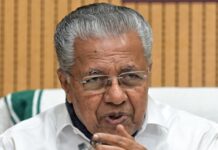Assuring that no country will be left behind, Mr. Sameh Shoukry, Foreign Minister of Egypt and COP 27 President Designate, said the outcomes at Sharm el-Sheikh, the venue for COP 27, will be a turning point in terms of global climate action. “With its focus on implementation and delivery, COP 27 will be aimed at bridging the gaps in mitigation, adaptation, loss and damage and climate finance,” said Mr. Shoukry at the World Sustainable Development Summit (WSDS) on Thursday in New Delhi.
Distinguished speakers at TERI’s World Sustainable Development Summit 2022
“Enhancing ambition at all levels and on all fronts by continuing to urge for further revised NDCs from parties that are yet to submit theirs will be a priority,” Mr. Shoukry added. So will be empowering youth and civil society and making sure that the younger generation has a voice in the process. “Those who continue to suffer the most from the impacts of climate change (will) have the space to speak their minds and highlight to politicians and decision makers the importance of taking sometimes painful but necessary steps in the right direction,” the COP 27 President Designate said while speaking at a session on COP Charter of Actions – From Glasgow to Sharm el-Sheikh. Watch the session here.
Observing that COP 26 at Glasgow made significant progress in areas of carbon trading, enhancing transparency frameworks, strengthening the Santiago frameworks and providing support to countries to address loss and damage, Ms. Patricia Espinosa, Executive Secretary, United Nations Framework Convention on Climate Change, however asserted that “Any notion that we can ease up after COP 26 is misguided.” She underscored that, “Anthropocene climate change is an alarming reality… The implementation of the Paris Agreement at the national level and rules ensuring frameworks of process must begin immediately.”
On Day 2 of The Energy and Resources Institute’s (TERI) annual flagship Summit, international dignitaries deliberated on the takeaways from Glasgow and the way ahead at Sharm el-Sheikh. Speaking at a session on ‘Leadership in Developing Countries: Reconciling Opportunities and Challenges of Climate Resilient Development’, Dr. Yasmine Fouad, Minister of Environment, Egypt, said, “We have the Glasgow – Sharm el-Sheikh work programme on the global war on adaptation. It will focus on the next steps for implementation. The work programme will enable the full and sustained implementation of the Paris Agreement towards achieving the goal on adaptation, both action and support.” Watch the ministerial session here.
Bringing India’s expectations from COP 27 to the table, Ms. Leena Nandan, Secretary, Ministry of Environment, Forest and Climate Change, said there should be no doubt that the country is looking for clear and articulate positions on climate finance and technology transfer. “These are the real challenges. How do we translate our vision into action is the challenge… we have to work together in a concerted, co-ordinated and collaborative manner,” she said.
Underscoring the severity of the climate crisis, Professor Petteri Taalas, Secretary-General, World Meteorological Organisation, pointed out that the period from 2017 to 2021 has been the warmest period on record. “We have been breaking all-time records in temperatures and Greenhouse Gas concentrations. We have stored more than 90 per cent of the excess heat in the oceans and sea-level rise reached a new high in 2021,” observed Professor Taalas.
Asserting the need for agile action, Professor Taalas added, “The 1.5 degree target, at the moment, is barely alive. This really need to have more ambition at Sharm el-Sheikh, and at United Arab Emirates a year later.” Taking part in the deliberations, Mr. Alok Sharma, COP 26 President and Minister of State at the Cabinet Office, United Kingdom, observed, “The Glasgow Climate Pact calls on countries to revisit and strengthen their 2030 emission reduction targets as necessary to align with the Paris temperature goals by the end of this year. It commits us to rapidly scale up climate finance and double finance for adaptation by 2025.”
About TERI
The Energy and Resources Institute (TERI) is an independent, multi-dimensional research organization, with capabilities in policy research, technology development, and implementation. Headquartered in New Delhi, TERI has regional centres and campuses in Gurugram, Bengaluru, Guwahati, Mumbai, Panaji, and Nainital, supported by a multi-disciplinary team of scientists, sociologists, economists, engineers, administrative professional and state-of-the-art infrastructure.
































